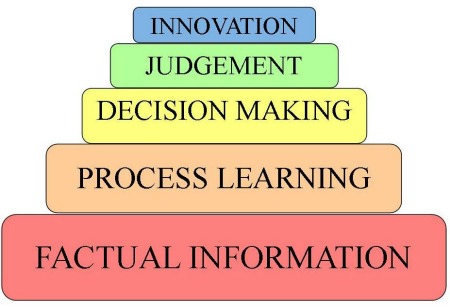To mark the end of TrainingZone’s virtual training month, Stephen Walker looks at how this form of training fits into the learning mix.
There are some real benefits in always available online training resources but some hidden dangers too. While a lot can be achieved through good assessors, not everything can be learned without doing it.
Virtual learning – internet-based, interactive learning tools – has a tremendous value today. If you want to learn at 2am you can, you can pace yourself and fit your learning around your own life not an academic calendar.
The disintermediation of the teaching staff and faculty brings a massive reduction in costs. If the virtual learning is supported by human tutors there is even more to be learnt. Sometimes you just need to ask a question to have the dam burst and the understanding flood in.
 "No amount of factual learning will equip you to innovate. In the same way that ‘managing innovation’ is an oxymoron ‘learning to innovate’ is nonsensical."
"No amount of factual learning will equip you to innovate. In the same way that ‘managing innovation’ is an oxymoron ‘learning to innovate’ is nonsensical."There are two things we have to learn. We have to learn factual based information. We also have to learn behaviours.
In fourteen hundred ninety-two Columbus sailed the ocean blue
Facts: history, science, mathematics, law, accountancy . . . so many facts on every subject. I’m old enough to remember weekly tests in my junior school. "Learn the facts" was drummed into us.
You can learn facts online, at your own pace and with tests to suit your progress. The ability to expand subjects at the click of a mouse to explore specific subjects of interest suits the avid learner. It is easy to stray off track but audits of time spent versus progress provide a check on progress.
The internet is amply supplied with knowledgeable content. If anything the difficulty lies in sorting the good from the bad although third party accreditation is widely available.
Learn what the dough should feel like and how to get it feeling like it is well developed
The heading is a quote from the Fresh Loaf website. The article goes on to explain how to test for properly prepared dough.
Many years ago my wife tried to teach me how to bake bread. We worked side by side with the same ingredients. We weighed and mixed and kneaded and allowed it to rise in exactly the same manner.
The loaves were cooked together and my wife’s loaf was a delight to eat. My loaf was a decent organic substitute for Kevlar.
The Fresh Loaf website directs you to test your dough with the Windowpane test and I can see a learning process involving making bread and beginning to understand what the result of the kneading process should look and feel like. It is leading you to the next level.
The guided trial and error process
Now you know about the Windowpane test you can adjust your dough preparation to suit, using the loaf quality to refine your understanding of the test. This learning takes place in the practical world but is instigated by factual information from the virtual world.
A hierarchy of learning
It seems there is a hierarchy of things to be learnt. Not all of them can be learnt in the same way.

Each level in the hierarchy stands on the learning in the previous.
Horses for courses
Factual learning can be delivered virtually with all the human support built in to ensure progress. Likewise, process learning is perfectly sensible if you include things like the Windowpane test. And decision making skills, based upon facts and processes, are perfectly learnable online.
Judgement is difficult to encompass in a "fact" learning environment. To judge you must have experience, not just of the process but also of the world. You have to apply your learning in the wide context of reality. Do I see examples of people learning facts and using them to make judgements where decisions are all they have been trained to make?
Finally, no amount of factual learning will equip you to innovate. In the same way that "managing innovation" is an oxymoron "learning to innovate" is nonsensical. Innovation comes from everywhere. You can learn the basic tools for innovation, the facts and processes. But that isn’t the same as learning to innovate.
Conclusion
Virtual learning is a valuable and essential part of modern living. The Millenials are learning to know where to look for knowledge and who can use it instead of learning the facts themselves.
We need to be wary of assuming virtual online is capable of delivering everything. It isn’t. You will find facts in this article which will allow you to exercise judgement for yourself about the validity of online learning.
Stephen Walker is a co-founder of Motivation Matters, set up in 2004 to develop the management of motivation to inspire greater performance. He has worked for notable organizations such as Corning, De La Rue and Buhler and has been hired to help Philips, Lloyds TSB and a raft of others. You can follow Stephen on LinkedIn, Twitter, Facebook, YouTube and blog.
To mark the end of TrainingZone's virtual training month, Stephen Walker looks at how this form of training fits into the learning mix.
There are some real benefits in always available online training resources but some hidden dangers too. While a lot can be achieved through good assessors, not everything can be learned without doing it.
Virtual learning – internet-based, interactive learning tools – has a tremendous value today. If you want to learn at 2am you can, you can pace yourself and fit your learning around your own life not an academic calendar.
The disintermediation of the teaching staff and faculty brings a massive reduction in costs. If the virtual learning is supported by human tutors there is even more to be learnt. Sometimes you just need to ask a question to have the dam burst and the understanding flood in.
 "No amount of factual learning will equip you to innovate. In the same way that 'managing innovation' is an oxymoron 'learning to innovate' is nonsensical."
"No amount of factual learning will equip you to innovate. In the same way that 'managing innovation' is an oxymoron 'learning to innovate' is nonsensical."There are two things we have to learn. We have to learn factual based information. We also have to learn behaviours.
In fourteen hundred ninety-two Columbus sailed the ocean blue
Facts: history, science, mathematics, law, accountancy . . . so many facts on every subject. I’m old enough to remember weekly tests in my junior school. "Learn the facts" was drummed into us.
You can learn facts online, at your own pace and with tests to suit your progress. The ability to expand subjects at the click of a mouse to explore specific subjects of interest suits the avid learner. It is easy to stray off track but audits of time spent versus progress provide a check on progress.
The internet is amply supplied with knowledgeable content. If anything the difficulty lies in sorting the good from the bad although third party accreditation is widely available.
Learn what the dough should feel like and how to get it feeling like it is well developed
The heading is a quote from the Fresh Loaf website. The article goes on to explain how to test for properly prepared dough.
Many years ago my wife tried to teach me how to bake bread. We worked side by side with the same ingredients. We weighed and mixed and kneaded and allowed it to rise in exactly the same manner.
The loaves were cooked together and my wife’s loaf was a delight to eat. My loaf was a decent organic substitute for Kevlar.
The Fresh Loaf website directs you to test your dough with the Windowpane test and I can see a learning process involving making bread and beginning to understand what the result of the kneading process should look and feel like. It is leading you to the next level.
The guided trial and error process
Now you know about the Windowpane test you can adjust your dough preparation to suit, using the loaf quality to refine your understanding of the test. This learning takes place in the practical world but is instigated by factual information from the virtual world.
A hierarchy of learning
It seems there is a hierarchy of things to be learnt. Not all of them can be learnt in the same way.

Each level in the hierarchy stands on the learning in the previous.
Horses for courses
Factual learning can be delivered virtually with all the human support built in to ensure progress. Likewise, process learning is perfectly sensible if you include things like the Windowpane test. And decision making skills, based upon facts and processes, are perfectly learnable online.
Judgement is difficult to encompass in a "fact" learning environment. To judge you must have experience, not just of the process but also of the world. You have to apply your learning in the wide context of reality. Do I see examples of people learning facts and using them to make judgements where decisions are all they have been trained to make?
Finally, no amount of factual learning will equip you to innovate. In the same way that "managing innovation" is an oxymoron "learning to innovate" is nonsensical. Innovation comes from everywhere. You can learn the basic tools for innovation, the facts and processes. But that isn’t the same as learning to innovate.
Conclusion
Virtual learning is a valuable and essential part of modern living. The Millenials are learning to know where to look for knowledge and who can use it instead of learning the facts themselves.
We need to be wary of assuming virtual online is capable of delivering everything. It isn’t. You will find facts in this article which will allow you to exercise judgement for yourself about the validity of online learning.
Stephen Walker is a co-founder of Motivation Matters, set up in 2004 to develop the management of motivation to inspire greater performance. He has worked for notable organizations such as Corning, De La Rue and Buhler and has been hired to help Philips, Lloyds TSB and a raft of others. You can follow Stephen on LinkedIn, Twitter, Facebook, YouTube and blog.




